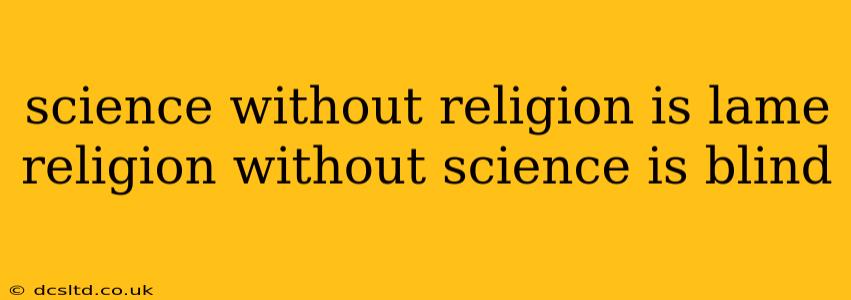Science Without Religion is Lame, Religion Without Science is Blind: Exploring the Interplay of Faith and Reason
The famous quote, "Science without religion is lame, religion without science is blind," attributed to Albert Einstein, encapsulates a complex relationship between two seemingly disparate fields: science and religion. While often perceived as conflicting forces, a deeper examination reveals a potential for synergy and mutual enrichment. This exploration delves into the meaning of Einstein's statement, examining the strengths and limitations of each perspective when considered in isolation, and ultimately arguing for a balanced approach that integrates reason and faith.
What did Einstein mean by "Science without religion is lame"?
Einstein's assertion that "science without religion is lame" highlights the limitations of a purely scientific worldview. Science, with its focus on empirical observation and verifiable data, excels at explaining the how of the universe. It unravels the mechanisms of nature, providing insights into the physical world and its workings. However, science often falls short in addressing the why. Questions concerning purpose, meaning, morality, and the ultimate nature of reality often lie beyond the scope of scientific inquiry. Religion, with its emphasis on spirituality, ethics, and a sense of the transcendent, provides a framework for understanding these deeper questions, offering a sense of meaning and purpose that a purely scientific approach might lack. Without the moral compass and ethical considerations often provided by religious or spiritual beliefs, scientific advancements could be used for destructive purposes, lacking a guiding framework for responsible innovation.
What did Einstein mean by "religion without science is blind"?
Conversely, Einstein's claim that "religion without science is blind" points to the dangers of a faith detached from empirical reality. A religion that ignores scientific findings, clinging rigidly to outdated beliefs in the face of overwhelming evidence, risks becoming irrelevant and even harmful. Blind faith, without the critical lens of scientific inquiry, can lead to dogma, superstition, and a rejection of reason. This can stifle intellectual curiosity, hinder progress, and ultimately limit our understanding of the world around us. A healthy engagement with science allows religious beliefs to be contextualized within a broader understanding of the universe, fostering a more nuanced and informed faith.
How can science and religion coexist?
The tension between science and religion often arises from differing methodologies and goals. Science seeks to understand the natural world through observation and experimentation, while religion often focuses on spiritual experiences, faith, and the supernatural. However, these approaches are not necessarily mutually exclusive. Many individuals find a way to reconcile their scientific understanding of the world with their religious beliefs. This can involve interpreting religious texts metaphorically rather than literally, accepting the limits of scientific knowledge in explaining certain phenomena, or recognizing that science and religion address different aspects of human experience. A balanced approach respects the value of both perspectives, allowing each to inform and enrich the other.
Is it possible to be both scientific and religious?
Absolutely! Many scientists hold deep religious or spiritual beliefs, demonstrating that faith and reason are not mutually exclusive. The history of science is replete with examples of individuals who were both devout and deeply committed to scientific inquiry. Their ability to integrate these perspectives demonstrates that it's possible to hold a complex worldview that encompasses both faith and reason. The key lies in recognizing the limitations of each approach and appreciating their respective strengths.
Can science prove or disprove the existence of God?
Science, by its very nature, deals with the observable and measurable aspects of the universe. The existence or non-existence of God, as typically understood within religious contexts, falls outside the realm of empirical investigation. Science cannot prove or disprove the existence of a supernatural being. This doesn't invalidate either science or religion, but simply recognizes their distinct domains of inquiry. The question of God's existence often resides within the realm of faith, personal experience, and philosophical reflection rather than scientific experimentation.
In conclusion, Einstein's insightful observation highlights the vital interplay between science and religion. A purely scientific worldview, devoid of ethical considerations and a sense of purpose, is incomplete. Conversely, a faith untempered by reason and evidence risks becoming dogmatic and detached from reality. The ideal lies in a balanced approach, where reason and faith inform and enrich each other, fostering a richer and more nuanced understanding of the world and our place within it.
